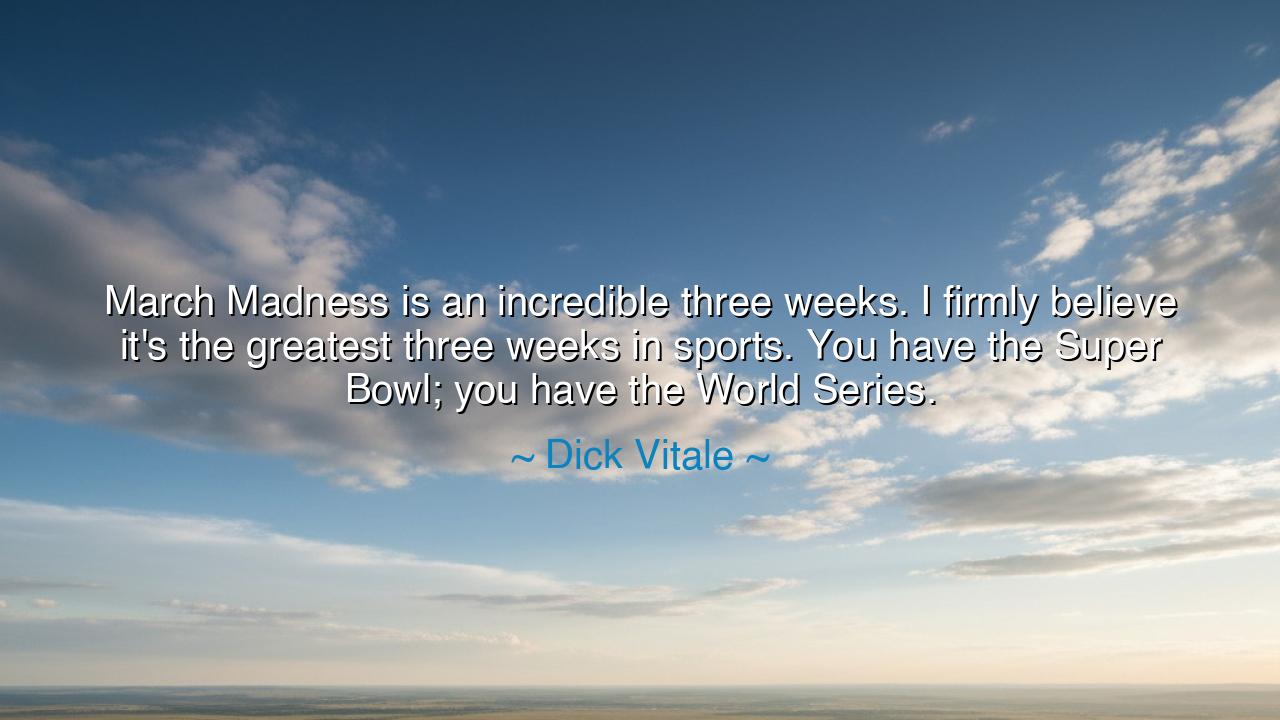
March Madness is an incredible three weeks. I firmly believe
March Madness is an incredible three weeks. I firmly believe it's the greatest three weeks in sports. You have the Super Bowl; you have the World Series.






The fiery voice of basketball, Dick Vitale, once proclaimed: “March Madness is an incredible three weeks. I firmly believe it's the greatest three weeks in sports. You have the Super Bowl; you have the World Series.” In this declaration lies more than the excitement of a tournament; it is the recognition of a spectacle where chaos and glory intertwine, where the ordinary can rise into the extraordinary, and where the spirit of competition is laid bare in its purest form. Vitale, who gave his heart and voice to the game, saw in these weeks a sacred festival, a modern echo of the ancient games where nations paused to watch greatness unfold.
This quote speaks to the essence of what makes March Madness unique. Unlike the single drama of the Super Bowl or the prolonged duel of the World Series, March Madness is a storm, a cascade of contests where fate writes and rewrites the story each day. For three weeks, the country turns its eyes to courts where giants fall and unknowns ascend, where one shot can carve immortality, and where each game breathes uncertainty until the final whistle. It is this unpredictability, this swirling tempest of drama, that elevates March Madness to the highest throne in the kingdom of sport.
History itself offers countless examples of these moments, when the improbable became the unforgettable. Recall 1983, when Jim Valvano’s North Carolina State team, thought too small, too weak, too unlikely, stunned the world by capturing the title. Their victory was not simply a win but a story of perseverance, proof that belief and effort can overturn every prediction. Or think of 1991, when the unheralded Richmond Spiders toppled mighty Syracuse, a victory that still echoes as one of the great upsets. These are the living epics Vitale spoke of—the dramas no scriptwriter could craft, for only destiny herself can pen such tales.
The ancients understood the power of games to bind a people together. The Olympic Games of Greece were not just contests of strength but celebrations of spirit, where city-states ceased wars to honor the drama of competition. March Madness is the heir to this tradition, a time when communities gather, when offices fall silent to watch, when alumni across the land remember their colors and rally behind them. It is not merely basketball—it is memory, identity, and unity forged in the fire of sport.
The meaning of Vitale’s words, then, is that greatness in sport lies not only in crowns or trophies, but in the shared experience of unpredictability. The Super Bowl may dazzle, the World Series may endure, but March Madness is a furnace of endless possibilities, where every underdog dreams and every champion must fight with all its might. It is sport stripped to its raw truth: you do not know what will happen, and that is why you must watch, must hope, must believe.
The lesson for life is as profound as it is practical. Just as March Madness reminds us that anything can happen, so too does life offer surprises beyond measure. The mighty may fall, the forgotten may rise, and destiny often crowns those who dared to believe when none else would. Therefore, let us face our days as though we are players in our own tournament: with courage, resilience, and the readiness to seize the moment that may never come again.
Thus, Vitale’s quote is not merely the passion of a commentator, but the wisdom of a prophet of sport. He teaches us that the greatest drama is not in certainty but in the unknown, not in perfection but in the chance to defy the odds. Let us embrace the madness, in games and in life, and find in its chaos the beauty of triumph, the lessons of defeat, and the eternal thrill of possibility.






AAdministratorAdministrator
Welcome, honored guests. Please leave a comment, we will respond soon